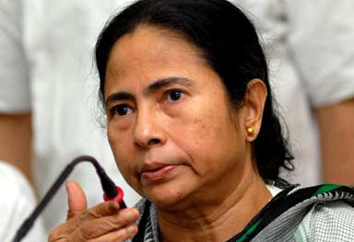
Kolkata, September 19: Trinamool Congress chief Mamata Banerjee today gave no indication of resiling from her decision to withdraw support to the UPA government when she ruled out any compromise on her demands for roll back of the major reforms decisions taken by the Central government.
"I will stick to my position, come what may...the (TMC) ministers will tender their resignations," she told reporters, a day after she announced withdrawal of support and pull out of ministers, if the government does not go back on its decisions.
Rejecting Finance Minister P Chidambaram's statement in Delhi this morning, she told reporters that nobody from Delhi contacted her before or after the Centre took the decisions to hike diesel price, cap supply of subsidised cylinders and allow FDI in retail.
"Minimum 24 cylinders should be given to a family in a year. How many times you will keep raising the petroleum prices? FDI in retail should be withdrawn," Banerjee said.
She said on September 14, the day the Union Cabinet took the decisions on FDI, she had told Congress President Sonia Gandhi that her party was opposed to these decisions.
Recalling that the statement of former Finance Minister Pranab Mukherjee that FDI in retail would not be implemented unless a consensus in reached among political parties, she said this is a commitment that the government adhere to.
The West Bengal Chief Minister said the government should implement any decision on FDI in retail only after a legislation is passed in Parliament in this regard. "FDI, we are not...we will organise protest everyday."
Last night, Banerjee had announced that her party would withdraw support to the UPA and pull out its ministers in protest against the economic decisions. She said she could reconsider her stand if the government slashes the diesel price hike of Rs 5 by Rs 3-4 per litre, withdraws the decision on FDI totally and raise the cap on supply of subsidised LPG cylinders.





Comments
Add new comment